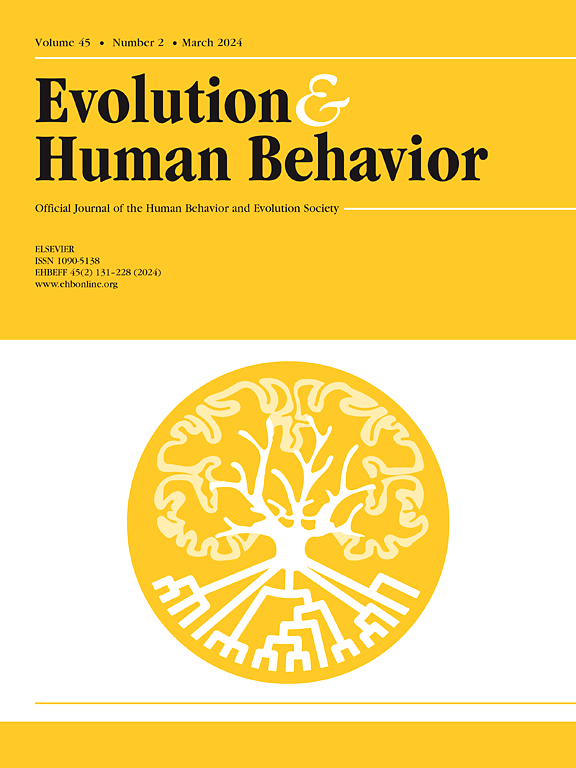Why collective music-making is sometimes rare: A study of four indigenous societies
IF 3.2
1区 心理学
Q1 BEHAVIORAL SCIENCES
引用次数: 0
Abstract
Current prominent music evolution theories suggest music evolved as a participatory group activity, whose adaptive functions were strengthening and/or signaling social cohesion. However, the prevalence of collective music-making varies substantially across societies, and in some cases is exceptionally rare. Here, we consider hypotheses for three factors which could attenuate collective music-making: diminished collective action more generally, an emphasis on musical expertise, and solo-oriented musical styles. We examine data related to these hypotheses in four societies in which collective music-making is rare: the Tsimane of lowland Bolivia, the Ache of eastern Paraguay, the Ayoreo of Bolivia and Paraguay, and the Tuvans of the Russian Republic of Tyva. Our results suggest that the scale and religiosity of collective action are the most important factors related to the overall degree of collective music-making in these cultures. The effect of musical expertise was mostly limited to the dominance of shamans in religious contexts, while well-developed solo musical styles did not necessarily prevent group performance in other social settings. We also note the importance of cultural loss due to influence of invading colonial and imperial forces in diminishing indigenous forms of collective music-making. Notably, in all the cases we consider, episodes of some form of collective music-making do (or historically did) occur during important social events, a fact which supports the group-functionalist view. Our findings also point to the centrality and ubiquity of the religious function of music, and suggest this aspect of musical behavior needs to be better addressed by evolutionary theories of music.
为什么集体音乐创作有时很罕见:对四个土著社会的研究
当前著名的音乐进化理论认为,音乐是作为一种参与性的群体活动进化而来的,其适应功能是加强和/或表明社会凝聚力。然而,集体音乐创作的流行程度在不同的社会差异很大,在某些情况下是非常罕见的。在这里,我们考虑了可能削弱集体音乐创作的三个因素的假设:更普遍地减少集体行动,强调音乐专业知识,以及以独奏为导向的音乐风格。我们研究了四个社会中与这些假设相关的数据,在这些社会中,集体音乐创作是罕见的:玻利维亚低地的提斯曼人,巴拉圭东部的阿切人,玻利维亚和巴拉圭的阿约里奥人,以及俄罗斯特瓦共和国的图瓦人。我们的研究结果表明,在这些文化中,集体行动的规模和宗教性是影响集体音乐创作整体程度的最重要因素。音乐专业知识的影响主要局限于宗教背景下萨满的主导地位,而发达的独奏音乐风格并不一定妨碍其他社会背景下的群体表演。我们还注意到,由于入侵的殖民和帝国势力的影响,土著集体音乐创作形式的减少造成了文化损失的重要性。值得注意的是,在我们考虑的所有案例中,某种形式的集体音乐创作确实(或历史上确实)发生在重要的社会事件中,这一事实支持了群体功能主义的观点。我们的发现也指出了音乐的宗教功能的中心地位和无处不在,并表明音乐行为的这一方面需要通过音乐的进化理论来更好地解决。
本文章由计算机程序翻译,如有差异,请以英文原文为准。
求助全文
约1分钟内获得全文
求助全文
来源期刊

Evolution and Human Behavior
生物-行为科学
CiteScore
8.30
自引率
9.80%
发文量
62
审稿时长
82 days
期刊介绍:
Evolution and Human Behavior is an interdisciplinary journal, presenting research reports and theory in which evolutionary perspectives are brought to bear on the study of human behavior. It is primarily a scientific journal, but submissions from scholars in the humanities are also encouraged. Papers reporting on theoretical and empirical work on other species will be welcome if their relevance to the human animal is apparent.
 求助内容:
求助内容: 应助结果提醒方式:
应助结果提醒方式:


